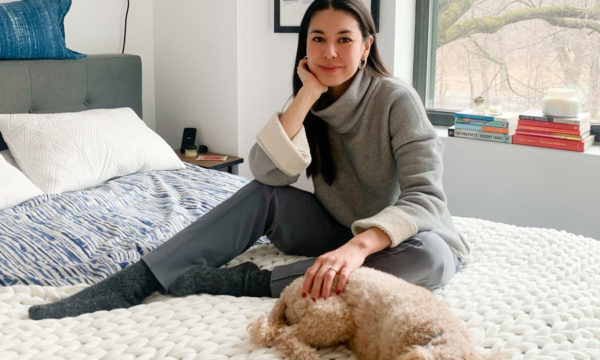Professor Heidi K. Brown on Why ‘Introverted Lawyer’ Isn’t a Paradox
January 11, 2018 | Filed in: Your Brain
We all know how the stereotypical lawyer is portrayed: aggressive, extroverted, a masterful orator capable of winning a case based purely on a closing statement. But there are so many ways to be an effective attorney, and that stereotype can be discouraging for those who struggle with the more performative aspects of the job. That’s why attorney and Brooklyn Law School professor Heidi K. Brown wrote The Introverted Lawyer, offering practical advice for attorneys (and anyone else whose job requires public speaking) on getting through those intimidating situations. Below, we talked to her about authenticity, blushing, and the power of a great outfit.
On coming out as an introvert:
In college I was a good student, a good researcher, and a good writer, but I didn’t really have to raise my hand a lot and speak up in class. I went to law school when I was 21, and the classes were run by the very intense Socratic Method, where professors choose one student at random and ask them questions, and it can be really intimidating. My mentors, family, and friends would say, “Just do it. Do it a million times and you’ll get better at speaking up.”
I ended up with a job at a pretty aggressive litigation firm right outside D.C. They threw us into the fire right away, which was exciting, but I was also terrified every time I had to go take a deposition or go to court. I kept trying to fake it, but the anxiety and the stress of trying to be something I wasn’t took a toll.
When I started teaching, I had an epiphany. I saw that my best and brightest students were often the most quiet, introspective ones, and so I started studying introversion, shyness, and social anxiety in the context of the legal profession, and that was what led me to write this book.
On the power of introversion:
Almost all of the lawyers on TV are extroverts who deliver these great oral arguments, or cross-examine a witness with no notes and always think of the perfect comeback right away.
This is a little dated, but the only introverted lawyer I can remember from pop culture is John Cage, the character on Ally McBeal. His catchphrase was, “I’m going to take a moment,” and he would be completely quiet and then suddenly the zinger would come to him. I always loved that, because that’s more realistic.
Pre-law students who are on the quieter side might think they’re not cut out for the law, when actually they’re very well suited for many of the activities we do as lawyers—things like like active listening, thoughtful writing, creative problem solving, and having empathy for others so you can help them. The law is not all about putting on a show; it’s about solving problems in a creative manner.
On authenticity and imperfection:
I’ve found that being authentically imperfect is a much more human way to go through your professional and personal life. As soon as I stopped trying to be perfect in every scenario, and instead strived to be more authentic—even if that meant I had to look at my notes, or repeat a question, or clarify something I didn’t say perfectly the first time—I found that I could make a deeper connection with the person I was speaking to.
What I tell my law students is, “Go watch real oral arguments,” because when we envision how an argument should go in court, we think of what happens on TV, which always is perfectly scripted. In real life, it’s never perfect, and you realize that these are just human beings. Nobody says every line perfectly—even the judges correct themselves. I think it helps to remind people that the jurors and the witnesses and the clients are all human beings.
On blushing:
I struggle with blushing a lot. I used to feel like every time I blushed, it was an advertisement that I was an impostor, a fraud, not qualified, weak. Then I read this great book by Erika Hilliard, who I cite in my own book, and she says that blushing is just “life coursing through you,” which totally reframed how I thought about it.
I used to wear turtlenecks and scarves to hide my blushing, but once I stopped trying to be perfect, I started being able to manage it better. Now, when I notice other people blushing, I feel a lot of empathy towards them, because I know what they’re going through in those moments.
On the power of self-presentation:
Some people might disagree with my approach, but I found that when I was trying to dress “like a lawyer,” it didn’t help my performance.
When I started teaching, I could experiment a little more with my wardrobe. I started developing my own style. I let go of trying to hide my blotchy neck, and it became fun to choose outfits that made me feel more edgy, or cool, or just different.
When I moved back to New York from California, I bought myself a watch that I wear all the time—it almost feels like a Wonder Woman cuff. The other thing that I’ve done is have a piece of jewelry made with a message on it. I love the band U2, and when I was in Dublin I bought a bracelet engraved with a U2 lyric in Gaelic, and I wear that on my other wrist. When I have my signature watch and my bracelet on, I feel like I can do anything. I think law students, especially female students, should embrace their own personal style as long as it’s respectful and professional.
On those who argue (pun intended) that the best lawyers are aggressive:
I strongly feel that if we only cater to or encourage or promote the extroverted persona in law, we’re going to miss out on a really important group of voices. We’ll miss out on people who are great at active listening, deliberate thinking, thoughtful writing, and creative problem solving. We need those voices in our classrooms and law offices to solve problems that, so far, we haven’t been able to solve.
There’s a National Task Force on Lawyer Well-Being, and there have been a lot of studies about the high levels of anxiety and depression in the legal profession. It really is a serious problem. We can’t just say, “Go do something else,” or “You’re not cut out for this,” but rather, we should take the time to understand what it is about our profession that is making people’s anxiety or depression worse. Part of the solution is to talk more about introversion, or fear of public speaking, or acknowledge that some more performative tasks are harder for some attorneys than others, and that’s okay. We can offer training and guidance, and remind them that we all get scared. In talking about it, we can start to figure out a way to empower those people.
Inspired to find your own Wonder Woman-esque accessory? Consider our Jupiter cuff. Shop that and other power pieces here.









